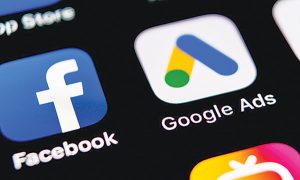Alphabet Inc. and Meta Platforms Inc., the world’s biggest digital advertising platforms, once again raked in astonishing amounts of money in 2021. “So what else is new?†you’re probably wondering. Almost every year for the past decade, the companies also known as Google and Facebook set profit records.
But this week marked a troubling difference. Facebook’s announcement that user numbers had dropped for the first time laid bare a long-neglected vulnerability: Digital advertising accounts for 98% of Meta’s revenue, and it also accounts for 81% of Alphabet’s. Of the world’s five biggest tech companies, including Amazon Inc., Apple Inc. and Microsoft Corp., Facebook and Google are the least diversified.
Though conventional wisdom says that conglomerates shouldn’t put all their eggs in one basket, it is hard to knock a business model that has been so successful. After all, people were calling Google a one-trick pony back in the early 2000s because of its bet on ads, and that bet has paid off handsomely two decades later. “Through most of the first decade the concept that Google would make $10 billion was inconceivable to people inside the company,†says Sridhar Ramaswamy, who ran Google’s ad business for about five years until he left in 2018.
The difference now is that the world around Google and Facebook is changing in ways that look very different than the 2000s or even the 2010s, making their over-reliance on the ad business a potential problem down the line. Facebook’s revelation that its daily active users numbers had dropped for the first time in 18 years — news that sent its shares plunging 20% — is just one sign of those changes.
Technologists, for one, are also talking about a radical shift to Web3, where large online platforms will be replaced by systems underpinned by blockchain, a move that would require rethinking the companies’ revenue model. Regulators, meanwhile, are targeting Google and Facebook’s dominance of the digital ad space; and young people’s gravitation to gaming, messaging and TikTok has already threatened Facebook’s all-important engagement metrics with advertisers.
Today, Google Cloud trails Amazon and Microsoft, with 9% of global market share. Cloud made up 7.5% of Alphabet’s revenue in 2021, up from 7.2% in 2020. In the face of a major threat to its ad-market business, the company has something to fall back on, but it’s relatively small.
Facebook still has nothing to show for its efforts. Its recently abandoned cryptocurrency project followed a string of other side hustles that flamed out, including video player Facebook Watch and a digital assistant in Messenger that was meant to become a flourishing hub for e-commerce, but didn’t.
For now, the billions are rolling in for the digital ad business, which was resilient through the pandemic. It grew by 12.7% in 2020 and then by an astonishing 20% in 2021, according to eMarketer, which tracks the advertising
market.
But while Google and Facebook combined make up more than half the global digital ad market, competition is brewing from e-commerce heavyweights like Amazon, Alibaba Group Holding Limited and JD.com Inc., whose share is growing.
—Bloomberg
 The Gulf Time Newspaper One of the finest business newspapers in the UAE brought to you by our professional writers and editors.
The Gulf Time Newspaper One of the finest business newspapers in the UAE brought to you by our professional writers and editors.
